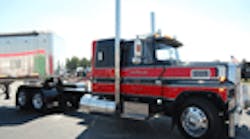On the surface, at least, customizing trucks with fancy paint jobs, chrome and aluminum accents, and finely crafted one-of-a-kind interiors seems extremely gratuitous for this industry. For starters, while profits in trucking used to be measured in pennies, they are today reduced to mere percentages of pennies—meaning the price tag for all that bling cuts heavily into a fleet or owner-operators’ bottom line.
(See photos of customized trucks from around the country)
Then there’s the work environment these trucks must survive in: racking up 120,000 to 150,000 mi. a year over rough roads, in bad weather, covered in dirt, grime, and corrosive ice-melting chemicals to boot. With all that in mind, not only does dumping some $10,000 into an eye-popping paint job or sheet metal work seem highly impractical, it borders on the suicidal, from a purely business perspective, of course.
Then you meet folks like Jerry Beaudoin, owner of Soil Recovery Systems (SRS), or Shawn Cielke, president of Sweet Rides Logistics, and your thinking on the practicality of show trucks takes a 180 deg. turn.
“I get a lot of work simply because people remember these trucks,” said Beaudoin, whose fleet of 13 trucks operates out of Southington, CT. “You’re a rock star every day you’re behind the wheel of one these trucks because no one forgets a delivery you make.”
Cielke, an owner-operator based out of Haugan, MT, puts it even more bluntly: “I’d say my truck affects about 80% of the freight I haul,” he said.
The reason Cielke feels so much of his business is related to his one-of-a-kind 2006 Kenworth W900B stems not only from the way it stands out from the other trucks on the highway, but what all the time, effort, and money he’s put into the vehicle represents in terms of service commitment to the customer.
(See photos from the 2010 Shell Rotella SuperRigs competition)
“The customer knows a truck like this won’t break down often, or at all, because by the way it looks, they know I take great care of it,” he explained. “They also know a truck like mine delivering their products impresses their customers. Dock workers and yard guards take pictures of this truck; so do DOT [Dept. of Transportation] inspectors. Thus my customers get noticed in ways they’ve never been noticed before.”
SRS’s Beaudoin echoes Cielke’s comments, saying he gets a lot of work simply because he operates such sharp-dressed steel. “Nobody forgets a delivery by one of his rigs,” he pointed out.
Beaudoin adds that operating such high-class trucks also allows him to find and retain some of the best drivers in the trucking business; not only does he own and staff a fleet of 13, he’s got another 100 owner-operators signed on to haul for him as well.
And it’s important to note that neither Beaudoin nor Cielke haul “special freight” in the sense that they serve markets that offer a high premium for cargo services.
In SRS’s case, in and around the northeastern U.S., numerous construction sites needed soil filled with chemical residues from factories and other heavy industries to be hauled away. It’s dirty, grimy, unappealing work for any trucker, yet also requires real skill in terms of operating end-dump trailers. Beaudoin thought he could do such work as well as anyone, while also bringing some major pizzazz to the business, a belief that paid off in spades for him.
Cielke hauls a smattering of everything, which includes a recent load of watermelons. But it’s what happens when a customer sees his truck that makes the difference, he said, pointing to the “watermelon load” as an example.
“We got that load through a broker,” Cielke noted. “But when I made my delivery, the customer came running up to my truck while we were unloading, camera in hand to take photos, and wanted us to start hauling his produce direct for him. All of a sudden, I now have a chance to sign up another regular customer. That’s the advantage a ‘fancy truck’ can sometimes bring you.”
“Driving a truck like this really puts a trucker in a whole new light for everyone he or she meets during the day,” stressed SRS’s Beaudoin. “That includes the customer, fellow truckers, and everyday motorists alike.”



